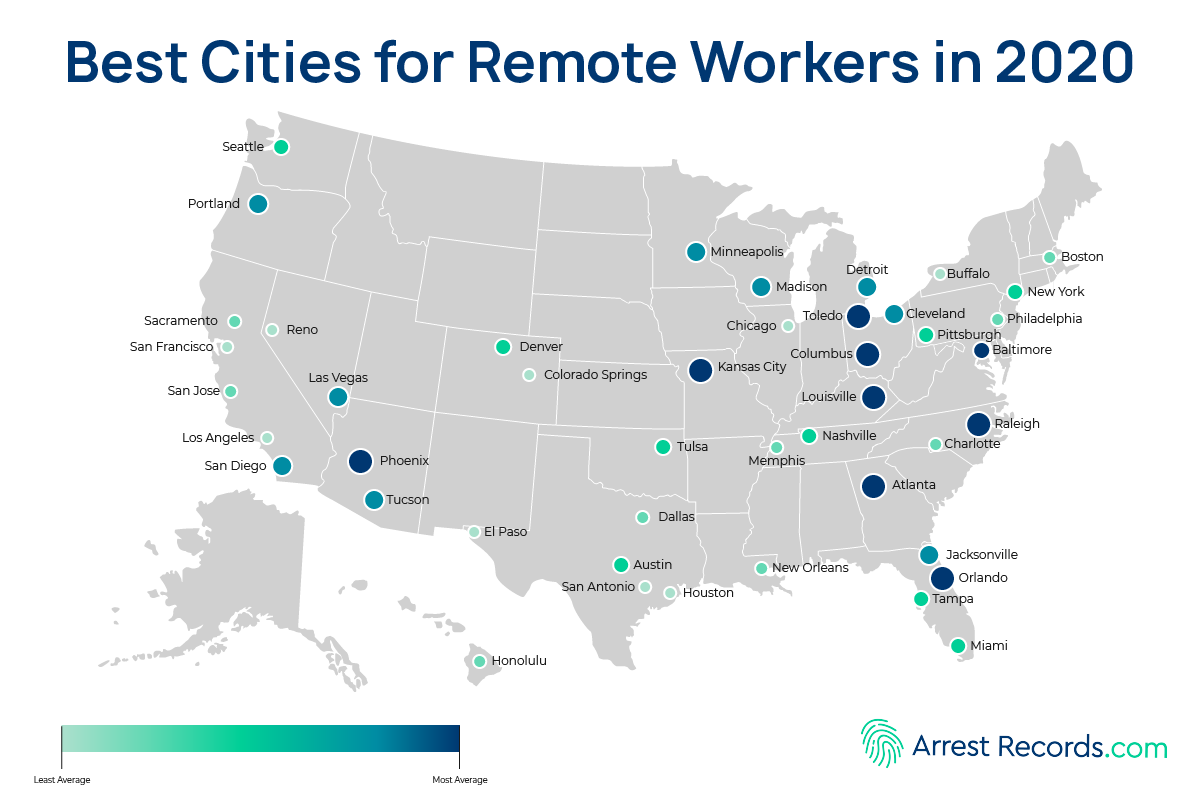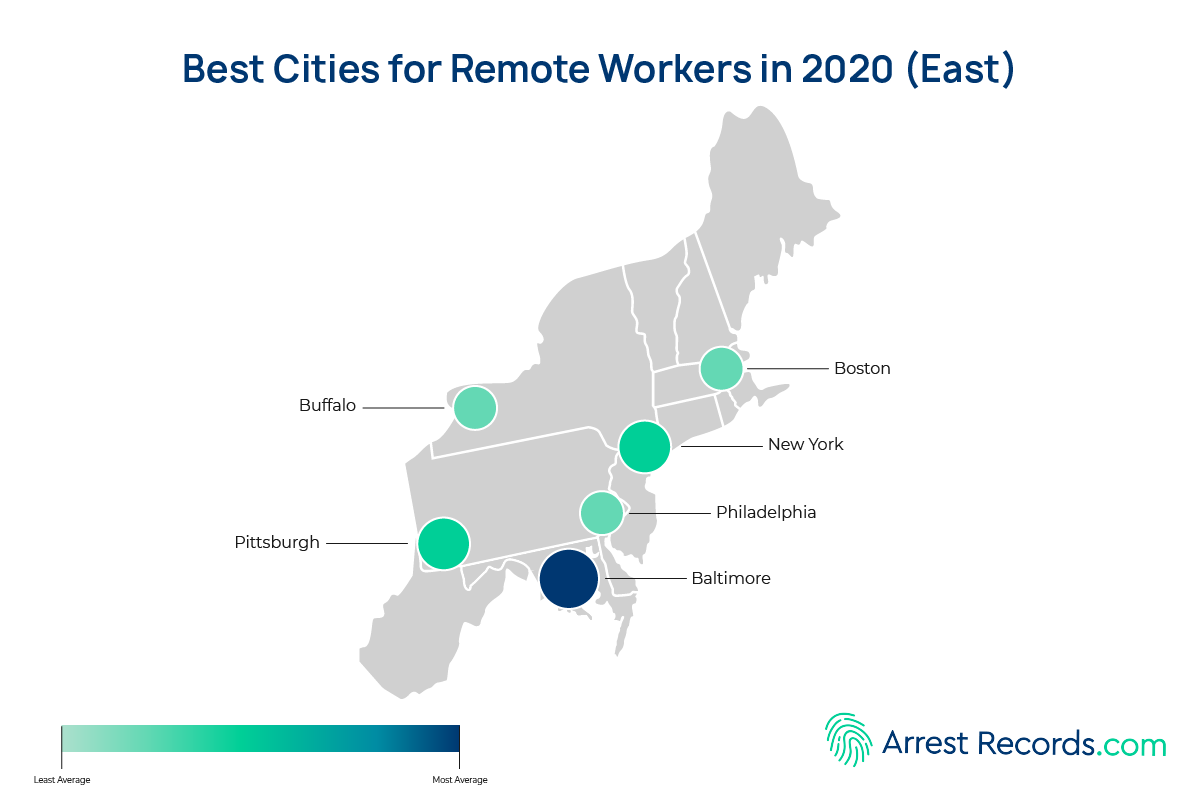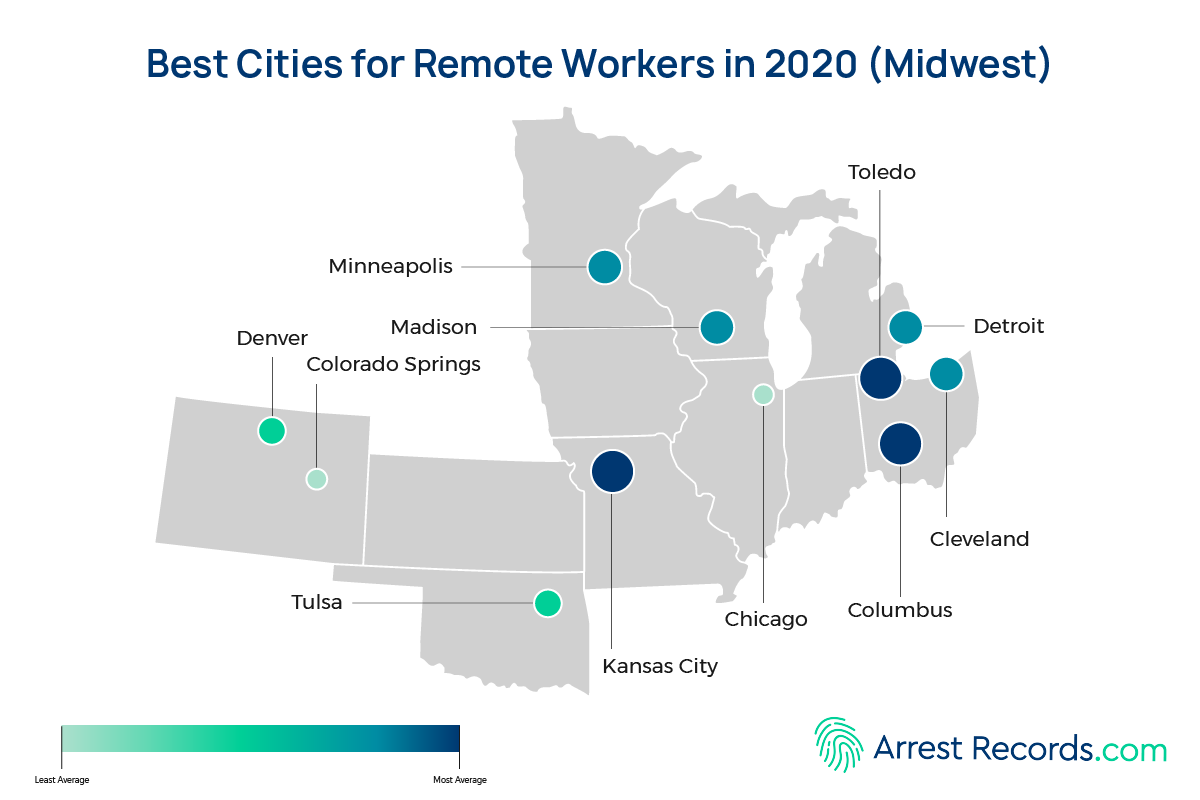The world is facing a challenging time. As countries across the globe fight to contain the spread of Coronavirus, it has forced many businesses to transform their workplace into a remote one. Many employees are now working from home.
While it may be a whole new world for some businesses, for others it’s common practice. Today, 4.7 million Americans work remotely, according to FlexJobs. The idea of “punching a clock” is fading as more and more employers offer remote positions or flexible schedules.
Remote work opportunities are growing quickly. Between 2007 and 2017, there was a 159% increase in remote work. The majority of employees (74%) believe remote job opportunities will become the new normal. Some even say that the Coronavirus could usher in a work-from-home revolution if companies implement the right strategies.
While remote work is possible in every city, there are certain ones that make the days easier. Which cities are the best for remote workers? We crunched some data to answer that very question.
We looked at things like internet connectivity, cost of living, and commute time savings. We also looked at cities with access to coffee shops, libraries, and coworking space, which gives remote workers a chance to work from different locations – when a pandemic isn’t occurring.
Our research reveals which cities in the U.S. are best for remote workers.
Key takeaways from our research:
- Phoenix, Arizona is the best city for remote workers
- Arizona and Ohio have two cities that ranked in the top ten best cities for remote workers
- 36% of the best cities for remote workers are in the South, 27% are in the West, 24% are in the Midwest, and 13% are in the East.
The best city for remote workers: Phoenix, Arizona
Phoenix, Arizona lands at the top of our best cities for remote workers. The capital of the southwestern state has coworking spaces that won’t break the bank, a low cost of living, and solid internet speeds.
Looking at these categories more closely, the coworking spaces in Phoenix are the most affordable of all the cities on the list. The city’s cost of living score is 13. Cities with scores close to zero are the most affordable. The internet speed ranks 16th among all 45 cities, so it provides a strong, consistent speed for workers.
Check out the Remote Workers Resource Guide

The top 45 cities for remote workers
While Phoenix, Arizona holds the top spot, there are plenty of other cities that are ideal for remote workers. Here’s a look at the rankings.
| Rank | City | State | Reigon | Average Score |
|---|---|---|---|---|
| 1 | Phoenix | Arizona | West | 70.625 |
| 2 | Atlanta | Georgia | South | 70.25 |
| 3 | Kansas City | Missouri | Midwest | 69.125 |
| 4 | Raleigh | North Carolina | South | 64.625 |
| 5 | Toledo | Ohio | Midwest | 62.625 |
| 6 | Louisville | Kentucky | South | 62.5 |
| 7 | Columbus | Ohio | Midwest | 62.25 |
| 8 | Baltimore | Maryland | East | 61.625 |
| 9 | Tucson | Arizona | West | 61.5 |
| 10 | Orlando | Florida | South | 60.5 |
| 11 | Portland | Oregon | West | 59 |
| 12 | Minneapolis | Minnesota | Midwest | 58.75 |
| 13 | Detroit | Michigan | Midwest | 58.5 |
| 14 | Las Vegas | Nevada | West | 58 |
| 15 | Cleveland | Ohio | Midwest | 55.875 |
| 16 | Jacksonville | Florida | South | 55.375 |
| 17 | San Diego | California | West | 54.375 |
| 18 | Madison | Wisconsin | Midwest | 53.625 |
| 19 | Tampa | Florida | South | 52.875 |
| 20 | Pittsburgh | Pennsylvania | East | 52.75 |
| 21 | Seattle | Washington | West | 52.375 |
| 22 | Nashville | Tennessee | South | 51.375 |
| 23 | Tulsa | Oklahoma | Midwest | 51.125 |
| 24 | Denver | Colorado | Midwest | 49 |
| 25 | Miami | Florida | South | 48.75 |
| 26 | Austin | Texas | South | 48 |
| 27 | New York | New York | East | 47.625 |
| 28 | Philadelphia | Pennsylvania | East | 46.75 |
| 29 | New Orleans | Louisiana | South | 45.25 |
| 30 | Charlotte | North Carolina | South | 44.375 |
| 31 | Honolulu | Hawaii | West | 44 |
| 32 | Dallas | Texas | South | 43.625 |
| 33 | San Francisco | California | West | 42.875 |
| 34 | Boston | Massachusetts | East | 42.625 |
| 35 | Sacramento | California | West | 42 |
| 36 | Memphis | Tennessee | South | 41.5 |
| 37 | El Paso | Texas | South | 41.5 |
| 38 | Reno | Nevada | West | 41.125 |
| 39 | Chicago | Illinois | Midwest | 40.375 |
| 40 | Colorado Springs | Colorado | Midwest | 39.75 |
| 41 | Houston | Texas | South | 36.75 |
| 42 | Los Angeles | California | West | 35.625 |
| 43 | San Jose | California | West | 35.25 |
| 44 | San Antonio | Texas | South | 35.25 |
| 45 | Buffalo | New York | East | 33.375 |
Cities in Arizona and Ohio are highly ranked for remote workers
In Arizona, Phoenix and Tucson made the top ten. In Ohio, Toledo and Columbus hold the top ten rankings too. The cost of living in all of these cities is among the lowest on the list and their internet speeds are solid as well.
Plus, research also shows more people want to live in these cities. Population growth is happening in Tucson, Columbus, and Phoenix, which is ranked the fastest-growing city in the U.S.
The south has the highest number of cities on the list
Out of the 46 cities that made our list, 16 of them – or 36% – are in the south. What does the south have to offer that others don’t? Our research shows it’s a combination of things. Southern states tend to have a low cost of living, fast internet speeds, and highly ranked coffee shops, libraries, and coworking spaces.




The benefits of working remotely
Companies forced to work remotely because of the Coronavirus could be skeptical. Will employees be productive? How will they be accountable for their work? There are many questions swirling around offices all over the country right now, but the truth is, working remotely has a lot of company benefits, which include:
Employees want flextime
Research shows an astounding 99% of employees want at least some “flextime,” or the ability to work from home, according to a survey from Buffer. It’s such an attractive perk that 51% of employees would change jobs if it meant more flexible hours.
Companies that are willing to offer remote positions, or at the very least, a flexible schedule several days a week, will likely retain more employees as needs of the workforce change.
Remote workers are more engaged
Engaged workers, those who are highly involved in their job and committed to their workplace, are often more productive, less likely to skip work, and genuinely want to do a good job for the company.
When employees have the chance to work remotely, engagement rates climb. Employees that work remotely 60-80% of the time have the highest engagement rates, according to a Gallup Poll. Workplaces with highly engaged employees report 41% lower absenteeism, 40% fewer quality defects, and 21% higher profitability.
Remote workers accomplish more, faster
Seventy-seven percent of remote employees say they’re more productive when they aren’t in the office, with 30% saying they get more done in less time and 24% saying they accomplish work at the same rate no matter where it’s being done, reports CoSo Cloud.
Reducing the carbon footprint
Sixty-seven percent of the American workforce has a commute that’s under an hour, according to Gallup. When workers aren’t commuting an hour to and from the office, it reduces the company’s carbon footprint. With fewer cars on the road, there are fewer pollutants released into the atmosphere.
Lesser-known tips to help remote workers be productive at home
Whether your workforce is new to working remotely or has been for some time, every remote employee can benefit from these tips:
Get started first thing
Working from home means there is minimal prep time and no commute, so you can get to work first thing. By doing so, you avoid trying to squeeze in a few household chores that can eat through your most productive morning hours.
Get dressed just like you would for the office
Yes, you can work in your sweat pants, but it’s best to keep a routine. Set an alarm, get up, and get dressed so you feel ready to start the day.
Have a dedicated workspace
Mentally, you need a space in your house that you use for work only. When you’re there, you know it’s work time. The workspace should be somewhere quiet where you can concentrate, take conference calls, and have limited access to distractions like TV.
Connect with coworkers regularly
To manage projects, expectations, and deadlines, you need to communicate. It becomes even more important when you can’t walk down the hall and talk to someone in their office. Schedule a time to talk every day or every other day.
Invest in tools to work as a team
There are plenty of tools that can help remote employees. We’ve created a list of resources that you can reference, but in general, look for tools with these functions:
o Instant messaging
o Video conferences
o Project management
o Time management
o To-do lists
o File sharing
Meal prep the night before
Make your lunch ahead of time and have a plan for dinner. If you have time, do some dinner prep to make your night go smoothly.
Have a cut off time
When you work from home, it’s hard not to check your emails, review a document, or make quick changes to a presentation at night, but you shouldn’t. You need a definitive time to stop working. Without a cut off time, you’ll feel like you’re always working and that can lead to burnout.
Wrap up
Working remotely is a growing trend in the workforce. In the future, more and more employees will seek out jobs with flexible schedules and work-from-home options. For those working remotely, there are certain cities that are better than others. Cities with fast, reliable internet, low cost of living, and a variety of alternative work locations are best.
Methodology
The following datasets were acquired through searching and data scraping on the web.
| Rankings | Weight | Source |
| Cities with best coffee (This is a complex ranking utilizing a variety of variables related to coffee, including but not limited to price, coffee shops per capita, and coffee championship.) | 1 unit 1/8 = 12.5 point | |
| Cost of living including rent (This is an index for various city based on the consumer price index and rental index). | 1 unit | |
| Number of coworking spaces per 100,000 people | 1 unit | Yelp, data scrapped. |
| Coworking cost per state | 2 units 25.0 point | |
| Internet speed ranking | 2 units | |
| Commuting time rank | 1 unit | Data based on US census. |

